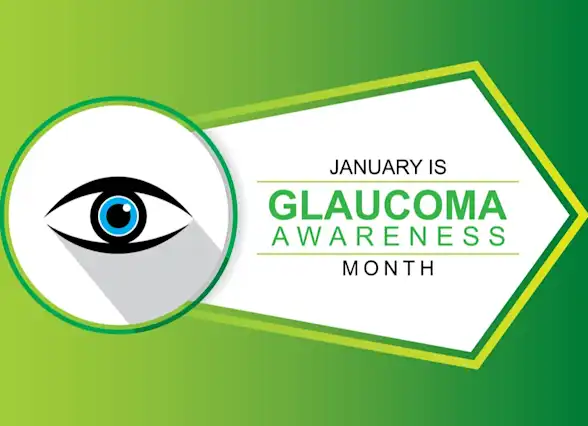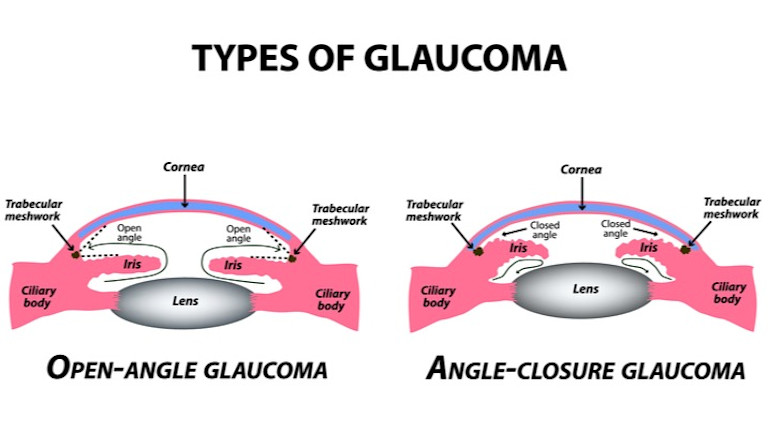Glaucoma Can Lead to Irreversible Vision Loss
Glaucoma can occur at any age but is more common in older adults. It is one of the leading causes of blindness in those aged 60 and older.
Get insurance benefits, legal documents, and medical records in one place

Helpful Highlights
Glaucoma comes in two types: open-angle and angle-closure. Angle-closure glaucoma is a medical emergency.
It is most common in those aged 40 and older, and risk increases with age.
Both can lead to permanent vision loss if left untreated.
Your loved one should get tested for glaucoma during annual eye exams.
What it is
Glaucoma is a group of eye conditions characterized by damage to the optic nerve, often associated with increased pressure inside the eye. This progressive optic nerve damage can lead to irreversible vision loss and, if left untreated, eventual blindness. There are two major categories of glaucoma, both with several variations:
Open-angle glaucoma is the most common type, affecting 95% of individuals with glaucoma, where fluid drainage from the eye is impaired, causing pressure to build up.
Angle-closure glaucoma, also known as closed-angle, narrow-angle, or acute glaucoma, is characterized by a sudden and complete blockage of fluid drainage, leading to a rapid increase in eye pressure. This emergency condition requires immediate medical attention to prevent permanent vision loss.

How can I tell if my loved one has glaucoma?
Open-angle glaucoma usually has no symptoms in its early stages, earning it the nickname "the silent thief of sight." However, as the condition progresses, symptoms may become more apparent. These can include:
blurred or hazy vision
the development of blind spots in the peripheral vision
eye pain
headaches
seeing halos around lights
In the case of closed-angle glaucoma, there may be sudden and severe symptoms such as intense eye pain, nausea, vomiting, and a noticeable decrease in vision.
Your loved one will need to tell you what they are experiencing, as there are no outwardly observable symptoms that you'll notice on your own.
What can I do for my loved one?
Regular eye exams are crucial for early detection, as symptoms may not be evident until significant vision loss has occurred. Early detection and management are essential in controlling glaucoma and preventing vision impairment.
If your loved one is diagnosed with glaucoma, here are the many ways you can help:
Continue with regular eye exams and specialist appointments (ophthalmologist)!
Medication management - Help them adhere to their prescribed eye drops and other medications for glaucoma, as well as those they take for other conditions.
Encourage activity and exercise - Moderate activity benefits overall health; exercising 3 or more times per week can reduce eye pressure.
Encourage protective eyewear - Make sure your loved one has sunglasses or transition lenses when spending time outside, and protective eyewear for tasks that can result in eye injury.
Assist with daily activities - Offer assistance with daily activities that may become challenging due to vision impairment, such as reading, cooking, or navigating unfamiliar environments.
Create a safe environment - Make necessary adjustments at home to create a safe and accessible environment. This may include proper lighting, reducing clutter, and installing handrails if needed.
Educate yourself - Learn about glaucoma and its management to better understand the challenges your loved one may face. This knowledge can also help you provide informed support.
Provide emotional support - Managing glaucoma can be taxing. Understand the emotional impact of vision loss and offer emotional support. Encourage your loved one to be open about their feelings and concerns.
Accompany them to appointments - Accompany your loved one to all medical appointments to offer support and address all relevant questions.
Supporting a loved one with glaucoma involves various aspects of care and understanding. Remember that your loved one's experience with glaucoma is unique from anyone else, so maintaining open communication and adapting your support based on their specific needs is essential.
RESOURCES
American Academy of Ophthalmology
The Eye Diseases Prevalence Research Group. (2004). Prevalence of open-angle glaucoma among adults in the United States. Archives of Ophthalmology, 122(4), 532-538. DOI
Zhang, N., Wang, J., Chen, B., Li, Y., & Jiang, B. (2021). Prevalence of primary angle closure glaucoma in the last 20 years: A meta-analysis and systematic review. Frontiers in Medicine. DOI
No content in this app, regardless of date, should ever be used as a substitute for direct medical advice from your doctor or other qualified clinician.
Get more support and guidance on insurance benefits, medical records and legal forms.
Helpful brings together your insurance benefits, legal documents, and medical records in one personalized place — so you always know what you have, and never have to search again.

Technology for Health Tasks. Mental Health for the Tough Stuff.
Helpful connects your medical records, insurance, and caregiving tasks automatically. And when you need more than logistics, a therapist is here to guide you.
In-Network and Covered
For Individuals, Couples and Families
HIPAA Compliant, Data Stays Private


Healthcare Tasks Simplified

From syncing records to spotting drug interactions, Helpful does the heavy lifting, turning complex health info into clear tasks and showing you benefits you can actually use, giving you clarity and control over your care.

In-Network Mental Health

Our licensed therapists are here to support you and your loved ones through stress, burnout, and life’s hardest moments, with an inclusive, compassionate approach that works with most insurance plans.

Create Legal Documents

Plan ahead by creating will, trusts, advance directives and more, that ensure your wishes are honored in the event you can’t speak for yourself -with Helpful guiding you every step of the way.